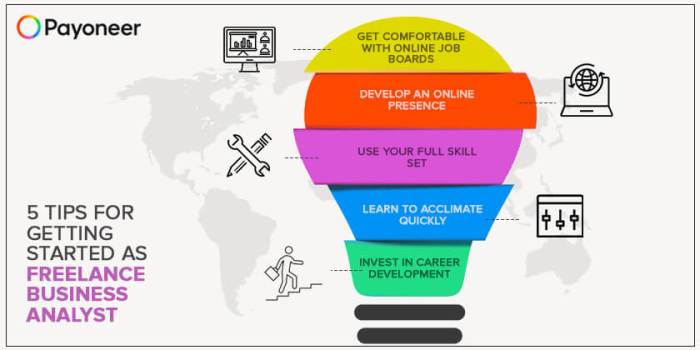Freelancing Tips and Tricks: Mastering the Gig Economy sets the stage for a deep dive into the world of freelancing, offering insights and strategies for success in this dynamic field. From defining freelancing to managing finances, this guide covers it all.
Understanding Freelancing
Freelancing is like being your own boss, hustling on your terms, and getting paid for your skills and expertise. It’s a gig economy vibe where you work for multiple clients on different projects without the commitment of a full-time job.
Popular Freelancing Platforms
- Upwork: Connect with clients worldwide and showcase your talents.
- Fiverr: Create gigs for your services and set your own prices.
- Freelancer: Bid on projects in various categories and build your portfolio.
Benefits of Freelancing
- Flexibility to work from anywhere, anytime.
- Opportunity to choose projects that interest you.
- Potential to earn more based on your skills and efforts.
Getting Started in Freelancing

Starting out in the world of freelancing can be exciting and overwhelming at the same time. Here are some essential tips to help you kickstart your freelancing journey:
Identifying Your Freelancing Niche
When it comes to freelancing, finding your niche is crucial. Here’s how you can identify your freelancing niche:
- Assess your skills and interests to determine what you excel at and enjoy doing.
- Research the market demand for different freelance services to see where you can offer unique value.
- Consider your previous work experience and expertise to narrow down your niche.
Creating a Standout Freelancer Profile
Your freelancer profile is your chance to make a great first impression on potential clients. Follow these steps to create a standout freelancer profile:
- Choose a professional profile picture that reflects your personality and expertise.
- Write a compelling bio that highlights your skills, experience, and what sets you apart from other freelancers.
- Showcase your best work samples to demonstrate your capabilities to potential clients.
Building a Portfolio as a Freelancer
Building a strong portfolio is essential for attracting clients and showcasing your skills. Here’s why having a portfolio is important:
- It allows potential clients to see the quality of your work and the range of services you offer.
- A well-curated portfolio can help you stand out from the competition and win more projects.
- Regularly updating your portfolio with new projects and testimonials can help you build credibility and trust with clients.
Finding Freelancing Opportunities
Finding freelancing opportunities is crucial for success in the freelance world. Here are some tips on how to land freelancing gigs and make the most out of them.
Exploring Different Ways to Find Freelancing Gigs
- Utilize freelancing platforms like Upwork, Fiverr, and Freelancer to browse and apply for projects.
- Network with other freelancers and potential clients through social media platforms like LinkedIn and Twitter.
- Attend networking events, conferences, and workshops to connect with potential clients and expand your reach.
Comparing Pros and Cons of Freelancing Platforms
| Platform | Pros | Cons |
|---|---|---|
| Upwork | Large pool of clients, easy to use interface | High competition, high fees |
| Fiverr | Easy to set up gigs, diverse range of projects | Limited communication with clients, low pricing |
| Freelancer | Global reach, secure payment system | Quality control issues, low-paying projects |
Tips on How to Pitch Effectively to Potential Clients
- Research the client and tailor your pitch to their specific needs and requirements.
- Showcase your skills and experience in a concise and compelling manner.
- Highlight your unique selling points and what sets you apart from other freelancers.
- Provide samples of your work or a portfolio to showcase your capabilities.
- Follow up with the client after sending your pitch to show your interest and commitment.
Managing Finances as a Freelancer

As a freelancer, managing your finances is crucial to the success of your business. From setting rates to budgeting and invoicing, here are some key strategies to help you stay on top of your financial game.
Setting Freelance Rates
When it comes to setting your rates as a freelancer, it’s essential to consider factors such as your experience, skills, industry standards, and the value you provide to clients. Here are some tips to help you determine your rates:
- Research the market rates for your specific skills and services.
- Calculate your desired hourly rate based on your financial goals and expenses.
- Consider the level of expertise and quality of work you offer compared to your competitors.
- Don’t undervalue your services – charge what you’re worth to sustain your business.
Importance of Budgeting and Managing Cash Flow
Budgeting and managing cash flow are vital for freelancers to ensure financial stability and growth. Here are some reasons why budgeting is essential:
- Helps you track income and expenses to make informed financial decisions.
- Allows you to plan for taxes, savings, and business investments.
- Prevents overspending and helps you stay within your financial limits.
Tips on Invoicing Clients and Tracking Payments
Invoicing clients and tracking payments are crucial for maintaining a steady cash flow in your freelance business. Here are some tips to streamline this process:
- Use professional invoicing software to create and send invoices efficiently.
- Include detailed descriptions of the services provided, payment terms, and due dates on your invoices.
- Follow up with clients on overdue payments and establish clear payment policies.
- Track all incoming and outgoing payments to maintain accurate financial records.
Building a Strong Client Base: Freelancing Tips And Tricks
Building a strong client base is crucial for success as a freelancer. By providing excellent customer service, cultivating long-term client relationships, and networking effectively, you can expand your opportunities and boost your income.
Providing Excellent Customer Service
Customer service is key to retaining clients and attracting new ones. Make sure to communicate clearly, respond promptly to inquiries, and deliver high-quality work on time. Showing professionalism and reliability will set you apart from the competition.
Cultivating Long-Term Client Relationships, Freelancing Tips and Tricks
To build a loyal client base, focus on building trust and rapport with your clients. Take the time to understand their needs and preferences, and go the extra mile to exceed their expectations. By consistently delivering exceptional results, you can turn one-time projects into long-term partnerships.
Networking for Expansion
Networking is essential for expanding your client base. Attend industry events, join online communities, and reach out to potential clients through social media platforms. Building relationships with other freelancers and professionals in your field can lead to valuable referrals and new opportunities.
